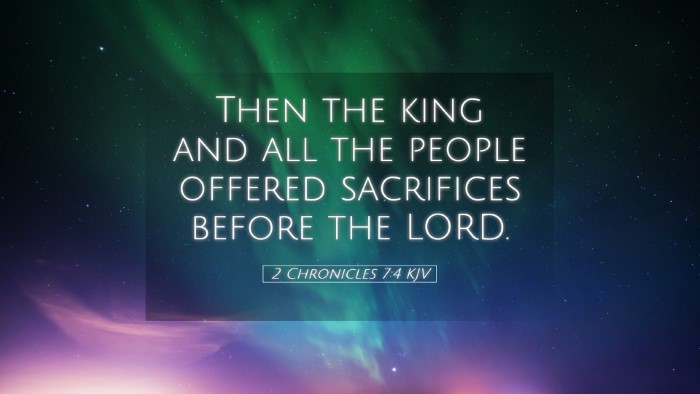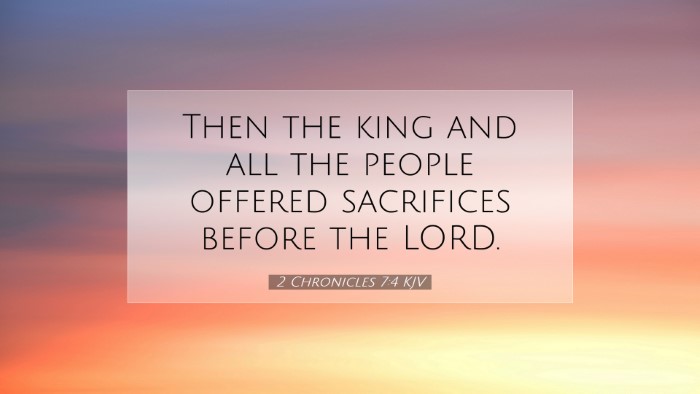Commentary on 2 Chronicles 7:4
Verse: 2 Chronicles 7:4 - "And the king and all the people offered sacrifices before the LORD."
Introduction
This verse captures a significant moment in the history of Israel, where the king—Solomon—along with the people of Israel, engages in public worship and offerings to God. It reflects the culmination of Solomon's dedication of the temple, a physical manifestation of God's presence among His people. The verse not only highlights the royal act of worship but also signifies the collective devotion of the Israelites.
Historical Context
Solomon's reign is characterized by prosperity, peace, and the establishment of the temple in Jerusalem. The building of the temple was a monumental task that took seven years and was dedicated to the worship of Yahweh. This context is crucial in understanding the significance of the sacrifices made by Solomon and the people. The act of offering sacrifices was not merely a ritualistic endeavor; it was an acknowledgment of God's sovereignty and a means to maintain a covenant relationship with Him.
Insights from Commentaries
Matthew Henry's Commentary
Henry emphasizes the communal aspect of worship highlighted in this verse. He notes, "The king and the people joined together in worship, signifying unity in purpose and devotion." This collective offering illustrates the shared responsibility of both the leaders and the laity in approaching God. Henry further elaborates on the nature of the sacrifices, stressing that they were acts of gratitude for God's blessings instead of merely fulfilling a religious obligation. He connects this act to the broader theme of national repentance and devotion, reminding readers that true worship must come from the heart.
Albert Barnes' Notes on the Bible
Barnes offers a detailed explanation of the significance of the sacrifices made at this time. He highlights that the multitude of offerings represented both personal and communal gratitude. The king's role in leading the people in these sacrifices was vital as it set the tone for spiritual revival. He states, "The king’s act of sacrifice was symbolic of Israel’s recognition of the divine as the source of their blessings." Furthermore, Barnes notes the importance of the location of these sacrifices, which took place before the altar, emphasizing the sacredness of the space dedicated for worship and the seriousness with which the people approached their God.
Adam Clarke's Commentary
Clarke provides a detailed exegesis on the implications of the people’s response to Solomon's leadership. He points out that the initiation of these sacrifices under Solomon’s reign marked a pivotal transition from a nomadic worship style to a centralized and structured worship in the temple. He remarks, "This act of offering sacrifices is both a rite of dedication and an acknowledgment of God’s central role in national identity." Clarke emphasizes that the offerings were diverse, symbolizing different aspects of worship, thus showing the richness of Israelite tradition and devotion at this moment.
Theological Implications
The act of offering sacrifices before the LORD is laden with theological significance:
- Covenant Relationship: The sacrifices are a reaffirmation of the covenant that God established with Israel, exemplifying the Israelites' commitment to live in obedience to God's commandments.
- Unity in Worship: This passage underscores the importance of corporate worship. Both the king and people participated in a communal act of devotion, highlighting the belief that worship is a collective expression of faith.
- Expression of Gratitude: The sacrifices signify gratitude for God’s provision and grace. They reflect a deep-seated recognition of God’s goodness and an acknowledgment of human dependence on divine favor.
Application for Today
The themes found in 2 Chronicles 7:4 are relevant for contemporary believers, especially in ecclesiastical settings:
- Corporate Worship: The verse serves as a reminder of the importance of coming together as a community of believers to worship God. Pastors can emphasize the importance of unity in worship and the collective responsibility of congregations.
- Cultivating a Heart of Worship: As with the Israelites, today’s worship should stem from a heart of gratitude. Churches can encourage congregants to engage in offerings—both monetary and service—as acts of thankfulness.
- Recognition of Divine Sovereignty: The act of sacrifice was a way of acknowledging God’s rightful place as sovereign. In a world that often promotes self-sufficiency, it is vital for believers to continually recognize their dependence on God.
Conclusion
2 Chronicles 7:4 is a profound reflection on collective worship and the heart behind acceptable sacrifices to God. The combined insights from established commentaries remind us that worship is a vital expression of our relationship with God, one that should be steeped in gratitude and unity. As we consider the act of offering sacrifices, we are invited to explore our own expressions of worship and our commitment to living in relationship with the divine.


